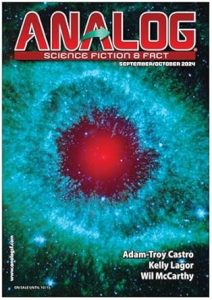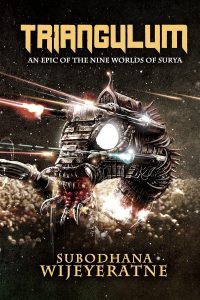Analog: Short Fiction Reviews by A.C. Wise
The October/November issue of Analog opens with the novella “Minnie and Earl Have a Kitten” by Adam-Troy Castro, set on the moon and featuring the author’s recurring characters, Minnie and Earl, who on the surface appear to be a sweet, elderly Midwestern couple, but in truth may be higher intelligences. Tish receives an invitation out of the blue from Minnie and Earl to visit them at their home, which recreates life on Earth a little too perfectly. Once there, she discovers they have some bad news for her, but they break it in the gentlest way possible, giving her space to grieve, while also giving her hope. It’s a touching exploration of family, depression, loss, and healing. “Bad Cop, No Donut” by Ryan Hunke is a story about two Philly cops, Frank and Tony, who are on the hunt for illegal synths. Tony has a kinder view of synths than Frank, and when they discover an array of suspicious machinery in the back of a bakery, he engages in a little creative interpretation in order to protect the bakery’s owner. The story has a fun voice, playing on stereotypes about cops, but also exploring the more serious subject matter of prejudice.
“The Compromise” by Tom R. Pike is framed as a meeting of unions and guilds debating The Compromise, an agreement between human and AI workers that is about to expire. Presenting varying points of view, the story explores the division of labor, whose work is valued, and how work is valued, among other topics – all of which feel very relevant as AI becomes increasingly prevalent in day-to-day life. In “The Fyootch” by Wil McCarthy, Dr. Charlene Epson-MacGuyver and her assistant Heidi Watson take it upon themselves to test a new transporter technology that destroys the original and replicates an exact copy. After Charlene takes the first journey herself, she seems to develop a happier, but more erratic and impulsive personality, and she and Heidi attempt to work out a series of tests to measure the change. “Discorporation” by Mar Vincent centers on Liet, who needs a new spine. Ingenia, the company which provided proprietary implants to many in the City, Liet included, has gone under after making too many false promises, leaving several citizens in a desperate situation. Liet agrees to a trade with a mysterious stranger, learning after the fact his true purpose is to broadcast a message about Ingenia that can’t be ignored. “The Space In-Between” by Brenda Kalt is a flash piece about an explorer trying to honor his grandfather’s legacy by making discoveries on a new planet.
“Sleeping Giant” by Kedrick Brown sees a scientist named M make a research breakthrough after observing the behavior of ants and growing curious about their intelligence. “The Ones Who Refuse to Walk Away” by Andrea Kriz offers up an effective take on the classic “The Ones Who Walk Away from Omelas”, reflecting on what it means to live with violence, how much people will tolerate, and what walking away and becoming a refugee might mean. In “A Stream of Leaves” by Tony Ballantyne, Rachel finds herself taking a dangerous winter journey on the planet Orion after an encounter with a stranger, even as she seeks to free herself from reliance on alien technology and being beholden to others. “Carter’s Refugio” by Hayden Trenholm is a procedural set in space. Willie Lumen arrives at a remote station to investigate a disappearance, and discovers a violent murder, leaving him to untangle the complicated web of motives and parties involved.
“The Circumambulation” by James Van Pelt is an effective take on an alien invasion story, placing the invasion itself in the background, and foregrounding two individuals caught in a crumbling marriage. The story is told in alternating points of view between Tyson, who is largely oblivious to the danger as he sets out to swim around the lake, and Carol, who has been glued to news of the disaster even as she meets up with their neighbor with whom she’s been having a long-term affair. It’s a lovely character study, and a wonderful approach to a disaster story. “Transitive Properties of Names” by Mark W. Tiedemann explores the challenges inherent in communication between species with a fundamentally different understanding of life, death, and the self, as a collective consciousness tries to explain what happened to a member of a ship’s crew to those who knew her best.
“Sex and Lies on the Internet of Things” by Filip Wiltgren is a flash piece about an AI seeking a human body who turns to a shady purveyor of all things questionably legal for help. In “Best Practices for Safe Asteroid Handling” by David Goodman, asteroid miner Xavier is assigned to train a new recruit named Halstead. What at first looks like a simple lapse in judgement around safety regulations turns out to be an attempt on Xavier’s life. Halstead mistakenly believes that Xavier has power and status that he does not, and that the other workers are oppressed, leaving Xavier to convince him of the truth while trying to stay alive. “It’s the Principle of the Thing” by Tim McDaniel is a very brief flash piece about an electron pulled over for speeding. “Firegrounds” by Jen Downes focuses on a fraught relationship between a mother and son, exploring guilt and responsibility. Jac has devoted her life to fighting fires, while her son seems intent on setting them. When she arrives at the scene of a blaze after picking her son up following his most recent arrest, she discovers he’s removed his tracker and has been gravely injured as a result of the fire he helped start.
“Starburst” by Meghan Hyland also deals with fraught family relationships, moving fluidly throughout various realities as a pilot who has left their physical body behind finds themself haunted by their relationship with their father and his refusal to accept them for themself. It’s a nicely done exploration of the complex emotions that can be involved when it comes to family, where a bond still exists, even when the relationship isn’t a positive one. “Fast Women, Loose Lips, and Treasure Ships” by Josh Pearce is a fast-paced exploration of identity. Pilots Thing 1 and Thing 2 have been modified and augmented to such a degree that even they question whether they are still human. When a salvage operation on an ark ship populated only with corpses puts their lives in danger, the two women begin to reassert their personalities and their own desires for their futures. “Gaiatosis” by Andrew Sullivan focuses on a woman named Sally who blames herself for an environmental recovery project gone wrong, causing a membrane to form over the ocean, suffocating the planet. Her estranged husband, Pat, is also dying, and the two events lead her to consider the meaning and nature of death itself, as well as what it means to survive and what the future might look like in a vastly changed world.
Recommended Stories
“Minnie and Earl Have a Kitten”, Adam-Troy Castro (Analog 9-10/24)
“The Circumambulation”, James Van Pelt (Analog 9-10/24)
This review and more like it in the December 2024 issue of Locus.
 While you are here, please take a moment to support Locus with a one-time or recurring donation. We rely on reader donations to keep the magazine and site going, and would like to keep the site paywall free, but WE NEED YOUR FINANCIAL SUPPORT to continue quality coverage of the science fiction and fantasy field.
While you are here, please take a moment to support Locus with a one-time or recurring donation. We rely on reader donations to keep the magazine and site going, and would like to keep the site paywall free, but WE NEED YOUR FINANCIAL SUPPORT to continue quality coverage of the science fiction and fantasy field.
©Locus Magazine. Copyrighted material may not be republished without permission of LSFF.


 Analog 9-10/24
Analog 9-10/24



